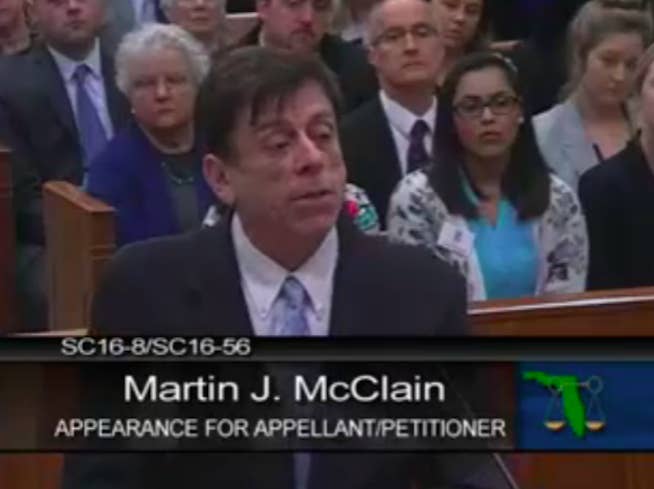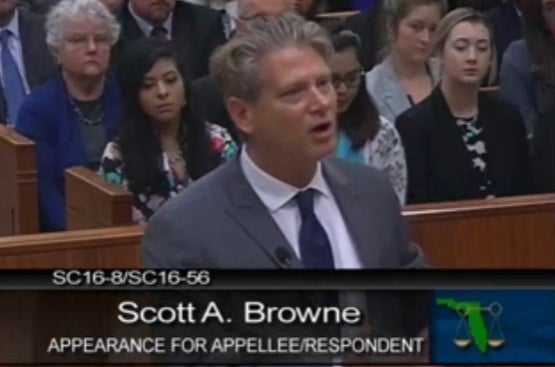
Executions appear to be on hold in Florida while the state’s supreme court considers arguments over the status of the state’s death sentencing law.
The U.S. Supreme Court ruled against the state’s death sentencing scheme in January for limiting juries to an advisory role when sentencing individuals to death, which the court ruled was a violation of the Sixth Amendment.
That decision, Hurst v. Florida, has left several questions to be resolved by the Florida courts, questions that hinge on whether the ruling is retroactive to past cases and how broad or narrow the Florida Supreme Court interprets the ruling.
On Tuesday morning, the Florida Supreme Court heard nearly an hour and a half of arguments over whether Cary Michael Lambrix’s execution — scheduled for Feb. 11 — should proceed as planned and whether the death sentence of another inmate, Richard Knight, should stand.
“To execute people in Florida on the basis of a statute that has been declared unconstitutional is just wrong,” Lambrix's attorney, Michael McClain, argued. “I think that the first step is to stay the execution so this court can thoroughly analyze Hurst, not just in one case in isolation, but have a complete understanding.”
Hours after the arguments, the Supreme Court granted Lambrix a stay of execution, pending further order of the court.
In the morning’s arguments, the defendants’ lawyers made the case that there is no death penalty in Florida today in the aftermath of the U.S. Supreme Court ruling and that, as such, all people on death row must have their sentences converted to life in prison.
The state, at the other extreme, argued that the ruling was a minor, procedural ruling that should not apply to past convictions like those of Lambrix and Knight, but rather only affect cases going forward.
About halfway through the first arguments, over Lambrix’s case, Justice Barbara Pariente summed up the difficulties facing the state court justices.
“[Lambrix’s lawyer] wants to reduce every sentence to life, the state wants to say this is the narrowest ruling ever,” she told Browne. “I think we have to come up with something that is actually what Hurst holds, and what the Florida statute is.”


Lawyers for Florida argued in defense of the state's current death sentences on Tuesday at the Florida Supreme Court.
In the Jan. 12 ruling in Hurst, Justice Sonia Sotomayor, writing the court’s opinion, stated, “The Sixth Amendment requires a jury, not a judge, to find each fact necessary to impose a sentence of death. A jury’s mere recommendation is not enough.”
That was not how things worked under the law in Florida. Describing the state’s law, Sotomayor wrote, “The trial court alone must find ‘the facts . . . [t]hat sufficient aggravating circumstances exist’ and ‘[t]hat there are insufficient mitigating circumstances to outweigh the aggravating circumstances.’” As such, she continued, citing an earlier U.S. Supreme Court decision, “[T]he jury’s function under the Florida death penalty statute is advisory only.”
In the concluding lines — or holding — of the case, Sotomayor wrote for the court, “The Sixth Amendment protects a defendant’s right to an impartial jury. This right required Florida to base Timothy Hurst’s death sentence on a jury’s verdict, not a judge’s factfinding. Florida’s sentencing scheme, which required the judge alone to find the existence of an aggravating circumstance, is therefore unconstitutional.”
The question of what Hurst holds — what its directive to lower courts is — was at the center of most of the debate in Tuesday arguments.
At one point, Justice Peggy Quince — who was recused from Lambrix's cases — acknowledged the potentially differing signals from the U.S. Supreme Court in the opinion.
"I can agree that, you know, it could have been a little better put together," she told the state's lawyer in the case, Lisa-Marie Lerner.
That debate, more or less, came down to which part of Sotomayor’s ruling controlled what the law in Florida can be going forward: her statement that “each fact necessary to impose a sentence of death” must be found by a jury or the holding that the jury has to “find the existence of an aggravating circumstance” to make a person eligible for the death penalty. In short: Does Hurst require juries to find the facts that make a person eligible for the death penalty, or does it require juries to make all the findings needed to impose the death penalty?
McClain focused on Sotomayor’s mention of the finding of “sufficient aggravating circumstances” required under Florida law to show that the U.S. Supreme Court views that as, effectively, “an element of the offense” of capital murder.
The state lawyers countered, however, that the holding of the case made it clear that the constitutional requirement is “simply an eligibility question,” as Scott Browne put it in opposing Lambrix's claim.
While a significant part of the Tuesday arguments focused on the scope of the Hurst ruling, the key question that the justice had asked the parties to address was whether the ruling applied retroactively to past convictions — like those of Lambrix and Knight.
The retroactivity discussion focused on whether the effect of the Hurst ruling is a substantive change, as the defense lawyers argue, or a procedural one, as the state lawyers argued. Generally, substantive criminal law rulings are given retroactive effect, while procedural ones are not. Regarding several recent cases addressing the scope of the right to a jury trial under the Sixth Amendment, the U.S. Supreme Court and some states have found that they are procedural decisions and, as such, not retroactive.
On Tuesday, Florida Supreme Court Justice R. Fred Lewis questioned whether the Hurst ruling could “go further” than those other cases “to cause a substantive impact” that the Florida court should find to be retroactive.
“I think it is — in theory — possible,” the state’s lawyer, Browne, said.
“There’s got to be something to the law,” Lewis continued, “that’s beyond just technicalities, and that one person is executed today, but the one who comes up tomorrow is not, and there’s really no difference to their cases.”
The effect of a ruling that Hurst is retroactive raised another, even more broad question, with Lambrix’s attorney arguing that if Hurst is retroactive, then all current death sentences in Florida have to be converted to life sentences.
The argument, as he explained it, is that re-sentencing is not an option because the court struck down Florida’s sentencing scheme as unconstitutional. As such, there is no death penalty now and applying any new statute passed by lawmakers to those currently sentenced to death would violate the constitutional bar on double jeopardy.

During arguments over Knight’s case, the argument came up again — though with a different focus: What does Hurst mean for people facing capital murder charges today?
A trial judge in Pinellas County, Florida, refused to hold a murder trial for Steven Dykes as a capital trial because there is no death sentencing law and so, he reasoned, there can be no capital trials.
On Tuesday, Justice Ricky Polston asked Knight’s lawyer, Todd Scher, “There can be no death penalty case until after the effective date of a new statute? That’s your argument?”
“There is no statute in place. That’s why people across the street are busy re-writing things,” Scher responded, referring to the legislature. “There is no valid death penalty statute in place.”
The only distinction between Lambrix and Knight’s cases present at Tuesday’s arguments was a side argument that related to the timing of their sentences.
One of the earlier U.S. Supreme Court cases addressing the Sixth Amendment jury right was a 2002 case striking down Arizona’s death sentencing scheme in Ring v. Arizona because it relied on a judge and not a jury to sentence a person to death after a murder conviction.
Although Florida’s scheme is slightly different because juries there do play a minimal role in the sentencing portion of death trials, the reason for the Hurst ruling striking down Florida’s law is the same as that used in striking down Arizona’s law in 2002.
Lambrix’s conviction and sentence were final before the 2002 decision in Ring; Knight’s was not — and his lawyers had argued at the time that Florida’s sentencing scheme was unconstitutional under Ring.
As such, Knight’s lawyers argue that even if the Florida Supreme Court rules that Hurst is not retroactive, it should, at the least, rule that those people like Knight who challenged their sentences since the 2002 ruling in Ring should be covered by the Hurst ruling.

